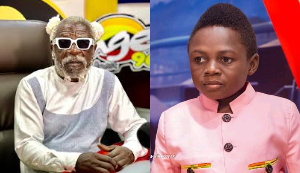The United Nations Educational, Scientific and Cultural Organisation (UNESCO), is sponsoring a Post-Graduate Diploma in Distance Education and a Masters Degree in Information and Communication Technology (ITC) at the Centre for Continuing Education, University of Cape Coast (UCC).
The UCC, has been selected as the host institution for the Anglophone countries of the West African sub-region for the programmes, which are a year's course each because of the University's enormous contribution to education in Ghana and the sub-region. The UNESCO's wing of the International Institute for Capacity Building in Africa (IICBA) in collaboration with the Indira Ghandi National Open University (IGNOU) made the arrangements. The visiting Director-General of UNESCO, Mr Koichiro Matsuura, on Saturday announced these when he launched the programmes at the UCC on Saturday.
He said UNESCO was contributing 70,000 dollars for the training of facilitators over a two-year period, while the UCC has procured equipment including 18 computers at a cost of 350 million cedis to facilitate the programme.
Mr Matsuura, described his visit to the country as "very successful" and said the continued co-operation between UNESCO and ECOWAS in area of education was encouraging.
He said the honour conferred on him by President Agyekum Kufour on Friday was a "very high honour for himself and for UNESCO". The Director-General observed that the UCC since its inception, has established a "fruitful partnership" with UNESCO, including the establishment of UCC Institute of Educational Planning and Administration thereby contributing to capacity building, to enhance the country's manpower development.
Mr Matsuura noted that the UCC has helped the country to respond to the changing needs of education on the continent.
He also observed that through the UCC's participation in the African Virtual University and other international educational programmes it was enhancing the University's capacity to share knowledge with other institutions in the country.
Mr Matsuura said, consequently, UNESCO was supporting the UCC and the University of Education, Winneba in post-graduate programmes in distance education and that 49 education experts were already benefiting from the programme.
He commended the UCC for executing the programme with a high level of professionalism and pledged his organisation's continued support for the initiative.
The Reverend Professor Emmanuel Adow Obeng, Vice-Chancellor of the University of Cape Coast (UCC), observed that education formed the centre of international initiatives in socio-economic programmes and the fight against HIV/AIDS.
He, however, regretted that African countries were overwhelmed by financial constraints among other problems, negatively affecting education thereby retarding the socio-economic development of most African countries.
The Rev Prof Obeng said the PDDGE, currently with 27 students, was envisaged to develop the capacity of participants to utilise their expertise in managing and delivering distance education programmes. He said the focus of training, covers areas such as writing of distance education modules, the administration and supervision of distance education programmes and professional support service for students.
The M.Ed in ICT programme, which is yet to take off, is designed to meet the needs of working professionals such as teachers, educational administrators and trainers working in the public or private sectors. Rev. Prof Obeng said the programme, blended educational theory and practice into a learning experience that developed skills applicable to complex real-world problems.
He added that the programme made available knowledge of how computers, software and other forms of high technology, could be used to improve learning outcomes.
Rev. Prof. Obeng said it is expected that graduates of the programme would form "core ICT" personnel at the universities, teacher training colleges and other educational institutions.
This, he said, would enable the graduates to effectively serve as managers, researchers, content producers, advisors and curriculum designers in ICT.
The Vice-Chancellor commended UNESCO for its various support in enhancing academic work at the UCC and appealed for assistance to procure means of transport for staff to the various study centres. Rev. Prof Obeng also requested for the establishment of computer laboratories and provision of facilities for video conferencing since the current the distance education was mainly by modules and monthly face-to-face interactions.
The minister of state in charge of basic, secondary and girl-child education, Ms Christine Churcher, reiterated the government's determination to make education accessible to all Ghanaian children irrespective of their backgrounds.
She also said the government was committed to making education the bedrock of national development and called on individuals and organisations to invest in education.
Ms Churcher said the importance of ICT in national development could not be underestimated.
Present at the ceremony were ministers of state of Togo, Benin, Cote d'Ivoire and Nigeria.
General News of Saturday, 10 January 2004
Source: GNA












